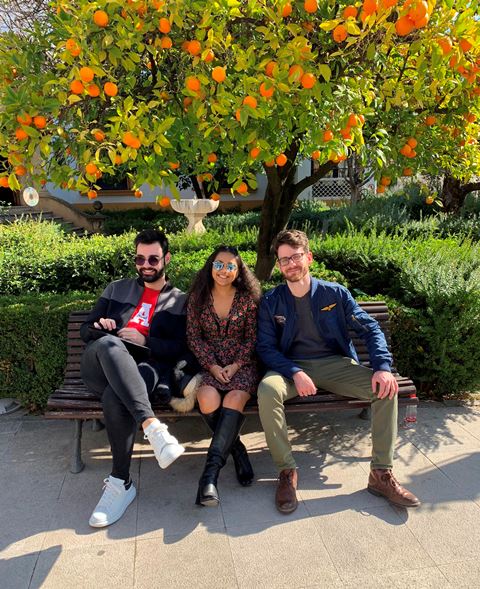Going Cross Cultural
29/03/2019

Sunshine, colours, good food and smiles – this is how I define Spain. From the classrooms at Cranfield University, we flew to the benches under the ripe orange-laden trees. Openness and acceptance were in the ambience of our surroundings. Where else could have been a better place to learn about “Cross-Cultural Management”?

Indians, Greeks, Chinese, Italians, Palestinians and French came together to dissect the Spanish culture. While walking around the beautiful amalgamation of Jewish, Catholic and Islamic architecture in La Alhambra, we divulged into the beauty of each other’s ethnicities. The Granada tour delivered by a Spanish tour guide turned more interesting when she was amused by my Indian attire. And soon we found ourselves lost in the co-incidental similarities between all the cultures present amidst us. This was the reason why Granada was the perfect destination to understand Cross Cultural Management. Especially, because at some point in time it was a city which witnessed the co-existence of Jews, Christians and Muslims. Irrespective of some highly atrocious results of cultural clashes in history, today we could sense the beauty in the cultural blend that those civilizations left behind them.
While the cultural lessons seeded the idea of perspective augmentation, the true mingling of cultures happened over Tapas, the typical Spanish drinks and food combination. I was fascinated to learn about the history behind Chinese names, as Indian names themselves come with well thought-of meanings behind them. What was further amusing was to learn about the different dialects in our cultures. I realised that at some point all of us are equally lost and oblivious of our cultures as the others. To a French who does not know Hindi, India would seem to be a place where he/she could not converse. However, even for me who is an Indian and knows Hindi, I too would be ill at ease in South India. This would be because the languages and dialects of Southern India are far from similar to Northern India. Similarly, my Chinese colleagues were as clueless as me when it came to Taiwanese. Whereas, the Taiwanese colleagues could help me understand both Chinese and Taiwanese. This created some sense of belonging amongst us.
I believe that I learnt the true “cross-cultural” management after living the different cultures alongside my multi-ethnic colleagues. This field trip accounts for the best experiences of my life. The learnings from this module, along with the memories, shall always be etched in my heart and mind.
Categories & Tags:
Leave a comment on this post:
You might also like…
Keren Tuv: My Cranfield experience studying Renewable Energy
Hello, my name is Keren, I am from London, UK, and I am studying Renewable Energy MSc. My journey to discovering Cranfield University began when I first decided to return to academia to pursue ...
3D Metal Manufacturing in space: A look into the future
David Rico Sierra, Research Fellow in Additive Manufacturing, was recently involved in an exciting project to manufacture parts using 3D printers in space. Here he reflects on his time working with Airbus in Toulouse… ...
A Legacy of Courage: From India to Britain, Three Generations Find Their Home
My story begins with my grandfather, who plucked up the courage to travel aboard at the age of 22 and start a new life in the UK. I don’t think he would have thought that ...
Cranfield to JLR: mastering mechatronics for a dream career
My name is Jerin Tom, and in 2023 I graduated from Cranfield with an MSc in Automotive Mechatronics. Originally from India, I've always been fascinated by the world of automobiles. Why Cranfield and the ...
Bringing the vision of advanced air mobility closer to reality
Experts at Cranfield University led by Professor Antonios Tsourdos, Head of the Autonomous and Cyber-Physical Systems Centre, are part of the Air Mobility Ecosystem Consortium (AMEC), which aims to demonstrate the commercial and operational ...
Using grey literature in your research: A short guide
As you research and write your thesis, you might come across, or be looking for, ‘grey literature’. This is quite simply material that is either unpublished, or published but not in a commercial form. Types ...






